Drug Rehab & Alcohol Rehab in Gloucester & Near Gloucester
Quick links for drug and alcohol rehab in Gloucester and near Gloucester
- Drug Rehab and Alcohol Rehab in Gloucester and near Gloucester
- Dual Diagnosis at Drug Rehab and Alcohol Rehab in Gloucester and near Gloucester
- Private vs Council-Funded Drug Rehab and Alcohol Rehab in Gloucester and near Gloucester
- Is Residential Drug and Alcohol Rehab in Gloucester or near Gloucester Suitable For Me?
- What are the Alternatives to Drug Rehab and Alcohol Rehab in Gloucester or near Gloucester?
- Hosting an Intervention to Encourage Attending Drug Rehab and Alcohol Rehab in Gloucester or near Gloucester
- How Much Does Drug Rehab and Alcohol Rehab Cost in Gloucester and near Gloucester?
- How to Choose the Right Drug Rehab and Alcohol Rehab in Gloucester and near Gloucester
- What Types of Therapies are Available at Drug Rehab and Alcohol Rehab in Gloucester and near Gloucester?
When a person is dealing with an addiction, [1] there may come a point when they begin to consider getting help be it from a drug and alcohol rehab Gloucester, near Gloucester or elsewhere.
Because addiction to drugs or alcohol is an extremely complicated condition, receiving assistance in overcoming it is often the best option.
If you or someone you know is considering drug or alcohol rehab Gloucester, there are many options to choose from. Drug and alcohol addiction treatment [2] doesn’t fall into a one-size-fits-all approach.
There are many different types of rehab programmes, all catered towards people’s different needs as they look to overcome their drug and alcohol addiction issues.
Getting help for a drug or alcohol problem can feel very overwhelming at first.
Not only are there a lot of different options when it comes to drug alcohol rehab Gloucester and surrounding areas.
However, many people facing addiction don’t believe their drug or alcohol problem is serious enough to warrant a rehab programme.
Just the mere mention of drug and alcohol rehab can also make a person feel worse about their current addicted state.
Without getting the proper help for addiction, however, many people find quitting drugs or alcohol to simply be too difficult.
Start your recovery journey today at a drug and alcohol rehab Gloucester by calling us on 0800 088 66 86
Drug and Alcohol Rehab Gloucester

People stood with raised hands outside of a drug and alcohol rehab in Gloucester
As the county town of Gloucestershire, Gloucester is home to the famous Gloucester Cathedral and attracts many visitors every year.
While it is a historic and beautiful place to live, Gloucester is not immune to the drug and alcohol problems that plague much of the United Kingdom.
The rate of alcohol-related hospital admissions is higher in Gloucester than the average across the UK [3], and this is also the case when it comes to the rate of alcohol-related violent crimes in Gloucester. [4]
This has placed a severe strain on the city’s health and policing services and as a result, there is a renewed focus on drug and alcohol rehab in Gloucester.
This is even more concerning when one considers the significant impact that alcohol addiction [5] has on a person’s life expectancy and their quality of life.
Sadly, these grim statistics are matched by the significant rate of drug and alcohol crime experienced in Gloucester and near Gloucester:
| Drug and Alcohol Crime Statistics in Gloucester and Gloucestershire | Numbers |
|---|---|
| Annual Crime Rate in Gloucester and Gloucestershire | 1.5 crimes per 1,000 workday people |
| Comparison to National Crime Rate | 55% |
| Crimes Related to Drugs and Alcohol in Gloucester and Gloucestershire | 1.6% |
| Total Number of Drug and Alcohol Crimes in Gloucester and Gloucestershire | 1.2k |
| Percentage Change in Drug and Alcohol Crime (Year-over-Year) | 2.8% |
| County Ranking (Crime Rate) | 8th out of 54 |
If you live in Gloucester and are struggling with an addiction to drugs and alcohol, continue reading to learn more about the drug and alcohol rehab options in Gloucester and near Gloucester that are all available to you.
A professional drug and alcohol rehab in Gloucester will give you a clear recovery plan [6] to help you overcome addiction, working through a wide range of different approaches [7] to ensure that you can tackle addiction from every angle.
To learn more about the many drug and alcohol rehab services available in Gloucester or near Gloucester, call us on 0800 088 66 86
Drug and Alcohol Rehab in Gloucester – What is the Disease Model of Addiction?

Patients in a group therapy session at a drug and alcohol rehab clinic in Gloucester
In the past, addiction was viewed as a moral failure that could be controlled at will. People with drug or alcohol addiction were seen to value short-term gratification and consciously make bad decisions out of habit.
While some people still subscribe to this method of thinking, the overall belief in our current society is that addiction is a disease of the brain.
Substance use has been proven to cause physical changes in the brain [8], meaning that medical treatment at a proper drug and alcohol rehab in Gloucester is required to recover.
It is thought to be extremely difficult and even impossible to recover from a severe addiction through sheer willpower alone.
Instead, people with substance use disorders require medical treatment and support to tackle the physical and mental aspects of this condition.
Drug and alcohol addiction can occur due to several factors and is not necessarily caused by pleasure-seeking alone.
For example, if one member of a family has a substance use disorder then the other members are also more likely to develop a drug and alcohol addiction, showing a genetic link between the two.
The way our individual brains work can also contribute to the development of an addiction, as well as environmental factors such as stress, childhood experiences and trauma.
As a result, addiction has now been classified as a brain disease with residential drug rehab and alcohol rehab treatment proven to be the most effective form of treatment.
You can read more about the disease of drug and alcohol addiction here.
To learn more about how a drug and alcohol rehab in Gloucester or near Gloucester can help you beat addiction for good, call us on 0800 088 66 86
Dual Diagnosis at Drug and Alcohol Rehab in Gloucester and near Gloucester

Therapist and patients talking at a drug and alcohol rehab centre in Gloucester
Addiction and mental health disorders often coexist simultaneously, and many people are not aware that they are living with more than one condition until they seek treatment.
If you are diagnosed with both a substance use disorder and a mental health condition, this is known as a dual diagnosis or a co-occurring disorder.
It is so common that between 30-50% of people entering drug and alcohol rehab are found to have a dual diagnosis.
These two conditions have been proven to interact with each other, with the presence of a mental health condition often impacting the individual’s recovery [9] from an addiction and vice versa.
It is common for people to self-medicate their mental health disorder with drugs and alcohol, or exacerbate an existing condition due to substance use.
As a result, both disorders are treated during addiction recovery to give you a higher chance of long-term recovery.
Common mental health disorders that exist alongside addiction include:
- Depression
- Generalised Anxiety Disorder (GAD)
- Post-Traumatic Stress Disorder (PTSD)
- Attention-Deficit Hyperactivity Disorder (ADHD)
- Obsessive Compulsive Disorder (OCD)
- Borderline Personality Disorder (BPD) [10]
- Bipolar Disorder
- Eating disorders such as anorexia and bulimia
- Schizophrenia
Our team at Rehab Recovery will refer you to addiction treatment services in Gloucester that treat a dual diagnosis with evidence-based and scientifically proven methods.
These may involve a combination of medication, counselling and lifestyle changes and will be unique to the individual.
This treatment may also involve close friends and family members as well as support to increase motivation and set achievable goals.
While a dual diagnosis can sometimes make it more difficult to recover from a substance use disorder, with the right support and treatment it is possible to go on to live a sober, healthy lifestyle with both conditions managed effectively.
To learn more about how a drug and alcohol rehab in Gloucester or near Gloucester will help to support your mental health, call us on 0800 088 66 86
What are the Benefits of Complete Abstinence from Drugs and Alcohol?

Therapy group at a drug and alcohol rehab clinic in Gloucester or near Gloucester
Some people believe that it is possible to use drugs or alcohol in moderation [11] after addiction recovery, as long as the individual is careful to control their use of drugs or alcohol.
However, choosing moderation over complete abstinence presents many problems and potential consequences [12] that can prevent you from reaching your long-term recovery goals.
Completely abstaining from drugs and alcohol can remove the risk of the affected person becoming addicted to a different substance in place of their original drug of choice.
Focusing on moderation leaves the door open for the individual to experiment with other substances – for example, if they are in recovery from a heroin addiction they may begin drinking alcohol as it is legal and more socially acceptable.
However, as alcohol is extremely addictive, this behaviour can quickly lead to a physical or psychological dependency. Deciding to completely abstain from all addictive substances removes this risk and leaves less room for error.
Similarly, abstinence can reduce the risk of drug and alcohol relapse.
As drugs and alcohol can cause chemical changes in the brain, some of which may be permanent, the affected person may always be more susceptible to drug or alcohol addiction.
Experts have agreed [13] that abstinence is always the safer and more effective route to addiction recovery.
Having the occasional drink of alcohol or taking a couple of pills on a stressful day may feel fine at first, but over time the changes in the brain can lead to increased tolerance and the uncontrollable urge to consume more.
If you decide at the beginning of your recovery journey that you will abstain from all drugs and alcohol, the signs of an approaching relapse will be clearer and you will be able to seek help promptly.
The drug and alcohol rehabs in Gloucester that we recommend will always work to help you achieve abstinence. Start your journey today by calling us on 0800 088 66 86
Private vs Council-Funded Drug and Alcohol Rehab in Gloucester and near Gloucester

Exterior photo of a drug and alcohol rehab in Gloucester
When researching drug and alcohol rehabs in Gloucester, you will immediately come across two choices: private drug and alcohol rehab and council-funded drug and alcohol rehab.
So how do you know which one is right for you?
The only notable downside of private drug rehab and alcohol rehab treatment in Gloucester and near Gloucester is the cost, which can be prohibitively expensive for many people.
Council-funded drug and alcohol rehab services in Gloucester and near Gloucester provide free treatment for those who meet the criteria, but due to the sheer cost of drug rehab and alcohol rehab treatment, [14] the waiting lists can be extremely long. Many people find themselves waiting weeks or even months [15] for treatment, which is time that many simply don’t have in the race against addiction.
The admissions process for private drug and alcohol rehab in Gloucester is fast and simple, with many patients being admitted to their chosen drug and alcohol clinic in just a few days.
Private rehab clinics often have the resources to offer alternative forms of
25therapy, such as equine or acupuncture therapy, which can be beneficial for patients with specific needs. It may be more difficult to access these treatments at a council-funded rehab clinic.
It is also more common to access an extensive twelve-month drug rehab and alcohol rehab aftercare programme after completing treatment at a private drug and alcohol rehab centre, which can help to decrease the chances of relapse in the coming months.
Aside from these differences, both private and council-funded drug and alcohol rehab clinics provide a high quality of care.
Patients will benefit from full physical detoxification if required, the prescription of any necessary medications and intensive counselling sessions.
Addiction is not considered a ‘choice’ or ‘moral failing’ on behalf of the addiction sufferer – rehab is always about treating the disease of addiction.
If you are finding it difficult to choose between private and council-funded rehab in Gloucester, get in touch with our team on 0800 088 66 86 and we will be happy to assist
Is Residential Drug and Alcohol Rehab in Gloucester Suitable For Me?
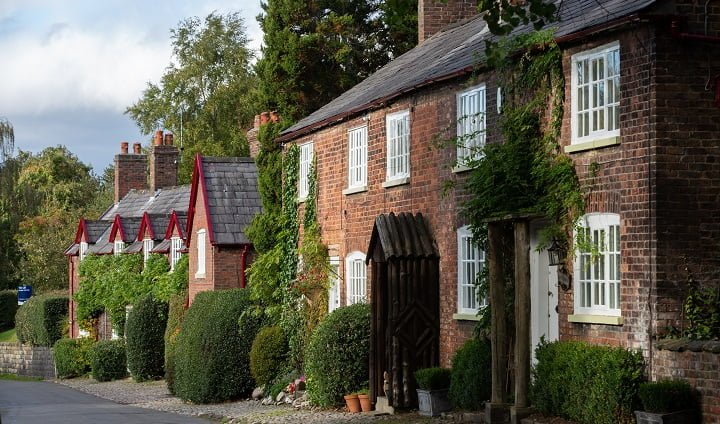
Depending on your past experiences with recovery and the severity of your addiction, you may find certain addiction treatments in Gloucester to be more effective than others.
While a stay at a residential rehab is likely to benefit anyone struggling with a substance use disorder, some options such as outpatient treatment and home detox may only be suitable for people who meet certain criteria.
If you have experienced severe withdrawal symptoms in the past, for example, this may limit your ability to recover at home as you are likely to have a similar reaction.
Other conditions such as co-occurring mental health disorders may also impact your recovery, as well as previous relapses and any prior suicide attempts.
- You are currently drinking more than 30 units of alcohol a day [16]
- You have been diagnosed with a mental health disorder that may impact your ability to recover at drug and alcohol rehab.
- You have been diagnosed with Wernicke-Korsakoff Syndrome [17]
- You have a physical or emotional health condition that may impact your ability to recover at drug and alcohol rehab.
- You have experienced severe drug or alcohol withdrawal symptoms in the past such as seizures or hallucinations.
- You have experienced suicidal thoughts or self-harm urges during past drug or alcohol withdrawals.
- You have attempted to recover from drug or alcohol addiction in the past but have relapsed.
- You have been violent and aggressive to others around you in the past when under the influence of or withdrawing from drugs or alcohol.
- You have been diagnosed as having a severe drug or alcohol use disorder according to the DSM-5 Criteria.
All patients are thoroughly assessed as part of the rehab admissions process, so you will learn more about your treatment options during this time.
Our staff will be happy to consider your personal preferences, but your safety and the effectiveness of your chosen treatment options will take priority.
To learn more about whether or not a residential rehab in Gloucester is the right choice for you, call us on 0800 088 66 86
What are the Alternatives to Drug and Alcohol Rehab in Gloucester or near Gloucester?

Patient meditating at a drug and alcohol rehab in Gloucester or near Gloucester
Professionally supported drug and alcohol rehab in Gloucester is one of the best ways to recover from addiction, but we also understand that this method of treatment may not be suitable for everyone.
Maybe your budget prevents you from accessing certain services, or you have home responsibilities that prevent you from staying away overnight.
Many people find it difficult to take time off work for rehab or feel hesitant about disclosing their drug and alcohol addiction to their employer.
Outpatient drug rehab and alcohol rehab in Gloucester and near Gloucester
It is possible to complete an addiction recovery programme while continuing to uphold your responsibilities at home and work.
Outpatient drug rehab and alcohol rehab treatment programmes allow patients to attend on a part-time basis, returning to their homes each day after sessions.
Although you will not stay at a drug and alcohol rehab clinic in Gloucester, you will receive the benefits [18] of medically-assisted detoxification, intensive counselling and a rehab aftercare programme.
This form of treatment is more affordable and accessible to many people and can be an effective option for those looking to recover at a rehab clinic close to home.
Many addiction rehabs and treatment centres in Gloucester offer outpatient services.
Local support groups and 12-step programmes in Gloucester and near Gloucester
Gloucester is home to a variety of local support groups for people struggling with addiction, the most well-known being 12-step programmes such as Alcoholics Anonymous and Narcotics Anonymous.
Meeting regularly in different areas of Gloucester, these meetings provide a safe space for people to come together and share their experiences.
They can provide support and advice to each other or simply be a listening ear, and this can form the basis of a strong support network that can decrease feelings of isolation and loneliness.
The meetings are free to attend, with the only requirement being that you participate, and many people credit AA and NA for being huge catalysts to their recovery.
Both of these organisations hold regular meetings in Gloucester.
SMART Recovery meetings in Gloucester and near Gloucester
Self-Management And Recovery Training (SMART) is a self-empowering form of addiction treatment in which patients are given the tools and techniques required to take actionable steps towards recovery.
They will learn how to avoid triggers, manage cravings and build motivation to reach their goals.
Based on Cognitive Behavioural Therapy (CBT) these techniques will also allow them to build a healthy and positive mindset while living a balanced lifestyle free from addictive substances.
Several SMART meetings are held in or near to Gloucester, as well as a wide selection of online meetings.
Home Detoxes without drug rehab and alcohol rehab in Gloucester and near Gloucester
Similarly to the above, a home detox can be completed in your own home without needing to travel and stay at a drug and alcohol rehab clinic.
Patients will be subject to a thorough assessment by a trained physician before the home detox begins and will be prescribed any necessary medications such as Librium, Acamprosate [19], Naltrexone [20] and others to help prevent severe side effects and keep them safe throughout the process.
They will also receive regular check-ins over the phone or via video conferencing services and will be given access to a 24/7 telephone helpline service in case of emergency.
Thanks to its remote nature, anyone in Gloucester who qualifies for a home detox can access it.
Drug and Alcohol Counselling in Gloucester and near Gloucester
Professional drug and alcohol rehab counselling can be extremely effective at helping you to recover from a substance use disorder, and this service is available both privately and on the NHS.
You will meet regularly with a trained and experienced counsellor who will assist you in developing a healthy mindset and learning ways to deal with stressful situations without reaching for substances.
It can be helpful to talk about your experiences, thoughts and emotions in a safe environment and your counsellor will be able to help you work through any underlying issues.
Many health services in Gloucester offer addiction counselling.
Al-Anon Family Support in Gloucester and near Gloucester
Having a close friend or family member who is caught in the trap of addiction can make you feel isolated and helpless. You may feel as though you have nowhere to turn, but thankfully there are several support groups across Gloucester available for people in your situation.
At Al-Anon meetings, you will meet other people who share similar experiences and will be able to provide advice and guidance. [21]
It is a safe place in which to express your thoughts and emotions while building a support network that can help get you through this difficult time.
To learn more about the various alternative addiction treatments in Gloucester, call our expert team on 0800 088 66 86
Hosting an Intervention for Drug and Alcohol Rehab in Gloucester
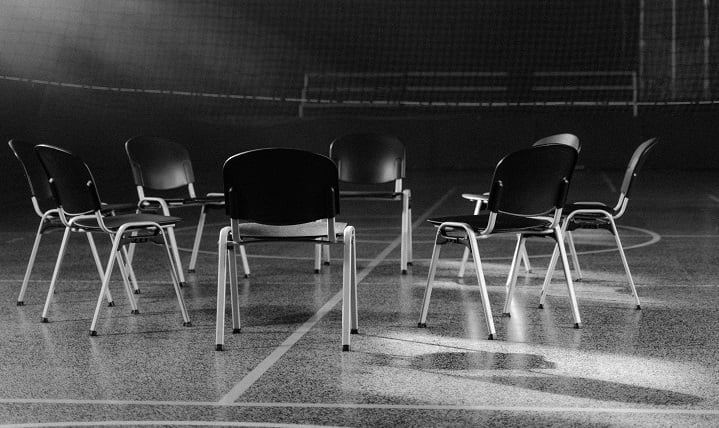
Chairs set up for group therapy at a drug and alcohol rehab in Gloucester
Although the negative effects and consequences of addiction are usually evident to their loved ones, people affected by addiction often struggle to come to terms with the fact that they have a problem.
They may deny their substance use and refuse to accept that they need help [29], even when faced with overwhelming evidence to the contrary. This can be extremely difficult for their friends and family, who can clearly see the extent of the addiction and the need for them to seek rehab treatment.
An intervention is a thoroughly planned and carefully executed [30] meeting between the affected person and a small group of their closest friends and family members. This may include spouses, adult children, parents, grandparents and members of their faith.
This meeting should take place in a neutral location, preferably when the individual is not under the influence of drugs and alcohol. It is also recommended that a professional interventionist or counsellor be appointed to run the meeting, to keep it controlled and calm.
Each person will have the opportunity to read a pre-written statement expressing their concerns and experiences with the addiction. They must be careful not to become angry, assign blame or raise their voice during this time.
Additionally, it is recommended that clear consequences are established if the affected person does not seek help for their drug or alcohol addiction. These may include a loss of access to children, a ban from the church or potential unemployment.
It is thought that the shock of realising the effect that their behaviour is having [31] on those around them combined with the initial confrontation may be the catalyst to push them into accepting help and rehab treatment.
However, an intervention does not have to be based on confrontation. Popular culture and the media have led many people to believe that there is only one type of intervention, but this is not the case.
The CRAFT Intervention for Drug Rehab and Alcohol Rehab in Gloucester and near Gloucester
Community Reinforcement And Family Training (CRAFT) [32] is a family-focused method of intervention based on rewarding positive behaviours and allowing negative consequences to occur.
It’s common for loved ones to unconsciously enable someone with an addiction – which is why both parents and partners are two of the 4-P causes of addiction [33] – often by making excuses for their behaviour or attempting to fix any problems that their substance use has caused.
CRAFT teaches family members and friends to step back and focus on their own physical and mental health, allowing the addicted person to face the repercussions of their actions.
They will also learn how to recognise and acknowledge positive behaviours, which in turn will encourage the individual to take more positive steps.
This gentler and more family-focused approach to drug and alcohol rehab intervention has been successful in many situations, removing confrontation and preventing emotionally charged arguments.
It is also important for the loved ones of addiction suffers to be able to spot the signs and symptoms of drug and alcohol addiction [34], especially when those suffering struggle to spot it themselves.
Such signs often include physical consequences, such as:
- Heart conditions
- Blood pressure issues
- Liver disease [35] and cirrhosis [36]
- Organ failure [37]
- Cancer
- Digestive issues
- Brain damage [38]
- A weakened immune system
Many addiction sufferers also struggle with mental disorders [39] that are connected to their addiction, including:
- Depression
- Anxiety
- Borderline Personality Disorders (BPD) and Anti Social Personality Disorders (APD) [40]
- Schizophrenia
- Post-Traumatic Stress Disorder (PTSD)
Those suffering from alcohol addiction are notably more likely to suffer from several distinct mineral deficiencies, including iron, zinc, magnesium and calcium. [41]
The specific nature of a person’s addiction will impact the symptoms they display, sometimes in very significant ways. For example, a type one alcoholic [42] will typically show signs of anxiety and low novelty-seeking, whilst a type two alcoholic will display high novelty-seeking behaviour and is more likely to have experienced alcohol and other substances at a young age.
Despite their different symptoms, both of these conditions are very serious [43] and very dangerous, and help will be needed to address them as soon as possible.
The longer an addiction is present, the worse it gets. [44] However, if support is given at the right time, even some of the most intense consequences of addiction can be healed. [45]
For help accessing the right drug and alcohol rehab in Gloucester, all our helpful team today on 0800 088 66 86
How Much Does Drug and Alcohol Rehab Cost in Gloucester?

Photo of a garden at a drug and alcohol rehab in Gloucester
Thanks to popular culture and the media, residential rehab has gained a reputation for being prohibitively expensive and regulated to celebrities and the super-rich.
However, this couldn’t be further from the truth.
The type of drug and alcohol rehab clinic you select, how long you choose to stay for and the amenities that you prefer can all influence the total price that you will pay and can be customised to suit your budget.
If you opt for a 10-day stay to complete a physical detox, you can expect to pay between £2,000 to £6,000 depending on whether you sleep in a single or shared room.
A 28-day stay can range between £8,000 to £12,000 if you have your own room, or £6,000 if you opt for a shared room.
Home drug and alcohol detox can cost as little as £1,500, although this treatment option does not include the intensive counselling and aftercare programme that is recommended to achieve long-term recovery.
No matter what your budget is, it is highly likely that Gloucester is home to a rehab clinic that suits your needs. Call our team for a more detailed breakdown of the costs associated with drug and alcohol rehab.
For a more specific answer to how much your stay at rehab in Gloucester will cost, call us today on 0800 088 66 86
How to Choose the Right Drug and Alcohol Rehab in Gloucester
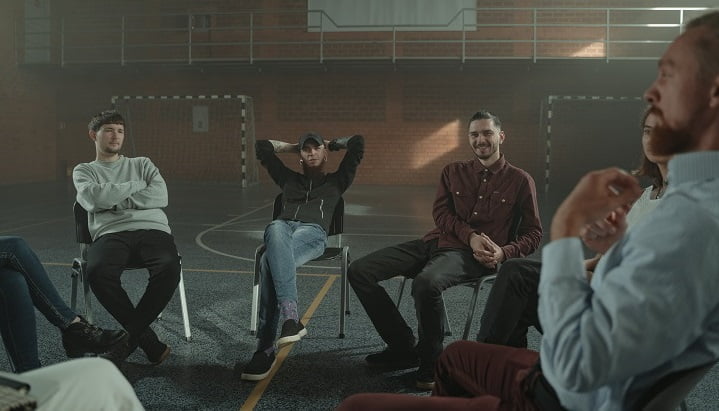
Alcohol support group meeting at a drug and alcohol rehab in Gloucester or near Gloucester
Gloucester offers a wide range of drug and alcohol rehabs, but a large number of choices and options can leave you paralysed when it comes to deciding on your treatment.
There are several factors to consider when selecting a drug and alcohol rehab in Gloucester, and choosing the right facility can often be the difference between short-term success and long-term recovery.
Make sure they specialise in treating your addiction
Many drug and alcohol addictions require specialised treatment to tackle both the physical and psychological aspects of dependency.
Some, such as heroin, can cause severe withdrawal symptoms and may require prescribed medication to help the patient through the process. It is essential that your chosen rehab has the tools and knowledge to effectively help you to recover.
Make sure your drug rehab and alcohol rehab works with your budget and lifestyle
While it is important to receive help and rehab treatment for your addiction, spending your rehab stay worrying about how you will pay for it is not conducive to a healthy recovery.
There are many drug and alcohol rehab clinics available in Gloucester that can work with you and your budget to find a treatment plan that suits your needs. Expensive doesn’t always mean better, so shop around and find a clinic that is best for you.
Make sure you feel comfortable in this particular drug rehab and alcohol rehab
On paper, a rehab clinic may appear to be perfect. However, it is important that you feel comfortable and safe with your medical team to truly benefit from this form of treatment.
Before committing yourself to a specific facility, take the time to meet with staff either in person or over the phone. This will allow you to get a feel for the clinic and determine whether you feel comfortable with your future medical team.
Make sure your drug rehab and alcohol rehab staff are trained, qualified and experienced
Addiction is a complicated and sensitive disease that requires specialised care.
As a result, you should only attend a rehab clinic in Gloucester with highly trained and competent staff that are experienced in treating your specific condition.
If they are unable to prove their staffs’ credentials, look elsewhere.
Make sure your drug rehab and alcohol rehab has a long track record
A rehab clinic that has been running for twenty years or more will naturally be more experienced than one that has only been open for a short time.
The length of time that a drug and alcohol rehab clinic has been running can go a long way in proving their success rate, as they would not be permitted to stay open unless they were effectively treating their patients.
Make sure to read reviews for your drug rehab and alcohol rehab clinic in Gloucester or near Gloucester
It’s not enough to simply read the testimonials on the rehab clinic’s website. Instead, go one step further and scour the internet for genuine and unbiased customer reviews.
This will give you an intimate understanding of their methods, treatments and bedside manner and will help you to determine whether this drug and alcohol rehab clinic is right for you.
For more guidance in choosing your ideal drug and alcohol rehab in Gloucester, call us on 0800 088 66 86
Understanding the Detox Process at Drug and Alcohol Rehab in Gloucester or near Gloucester

Couple walking outside after treatment at a drug and alcohol rehab in Gloucester
If you are physically addicted to a substance such as alcohol or heroin, you will likely benefit from medically-assisted detoxification at drug and alcohol rehab in Gloucester.
This is the process of gradually reducing the use of substances over a short period, usually around one week, until eventually you are no longer ingesting them.
Detox can be extremely dangerous if not correctly monitored and managed, so for this reason it is not recommended to detox without medical assistance.
Depending on the severity of your addiction, you may experience a range of withdrawal symptoms, These can vary according to each substance, but even the mildest symptoms can get worse very quickly.
Common alcohol withdrawal symptoms include:
- Nausea and vomiting
- Anxiety and depression
- Shaking and tremors
- Excessive sweating
- Headaches
- Insomnia
Severe alcohol withdrawal symptoms include:
- Extreme confusion
- Hallucinations
- Dehydration
- Seizures
- Unconsciousness
Undergoing a medically-assisted detox has many benefits, including the prescription of medication that can help to reduce or alleviate many of the more unpleasant symptoms of withdrawal.
Many rehab clinics will prescribe a 10-day course of Librium which can prevent alcohol withdrawal-related seizures, as well as common anti-depressants [46] or anti-anxiety medications [47] when appropriate, followed by two or three weeks of drug or alcohol counselling to address the underlying issues that contributed to the addiction.
Overall an individual can expect to spend around a month in drug and alcohol rehab, though the actual process of recovery can take anywhere from six months to five years. [48]
To learn more about detoxing through drug and alcohol rehab in Gloucester, call us on 0800 088 66 86
Cocaine Rehab in Gloucester
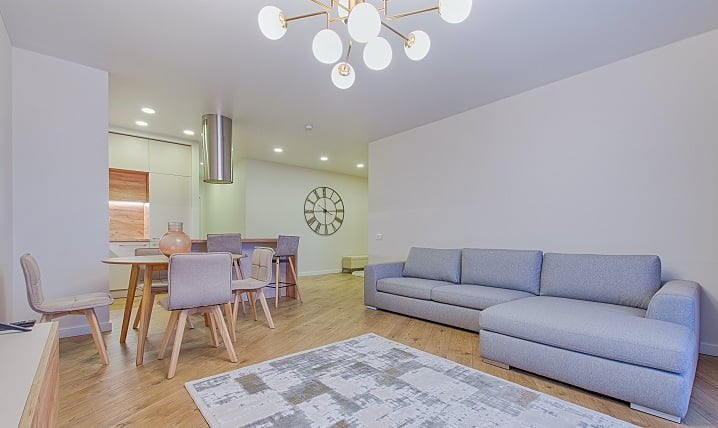
Cocaine is one of the most addictive stimulants available in the UK and, as a result, this substance is increasing in popularity year on year.
As cocaine increases the amount of serotonin produced by the brain, it can cause intense sensations of euphoria and pleasure while providing a boost of confidence and an increased amount of energy.
Over time, however, the brain may become unable to produce serotonin without the help of cocaine. This can result in a severe psychological addiction that may be impossible to break without professional help.
During cocaine rehab, many people experience intense cravings for this substance. As a result, they will benefit from 24/7 monitoring to ensure that they are not able to relapse during the treatment process.
Cocaine rehab typically involves [49] intense counselling sessions and prescribed medications to rewire the brain and encourage it to produce serotonin naturally again.
This can take some time, but with professional help, it is possible to break free from cocaine addiction and live a healthy and fulfilling life.
Beat your cocaine addiction with the help of a drug and alcohol rehab in Gloucester by calling us on 0800 088 66 86
Heroin Rehab in Gloucester

Couple holding hands at a drug and alcohol rehab in Gloucester
Both physically and psychologically addictive, heroin is often thought to be one of the most difficult substances to recover from.
Commonly injected or smoked, this powerful opiate can cause feelings of relaxation and euphoria when ingested.
It can cause intense withdrawal symptoms when reduced or completely stopped, and many people opt to switch to a less addictive substance such as methadone while they recover.
The first step towards recovery is to undergo complete physical detoxification, during which your body will be purged of heroin over a period of time.
This can be an extremely unpleasant and difficult process, but it will usually last for a maximum of seven days.
Once the withdrawal symptoms have subsided, patients will enter into a series of counselling sessions which may be comprised of cognitive behavioural therapy, dialectical behaviour therapy, group therapy or a combination of other treatments.
This will help them to address the psychological aspects behind the addiction and learn healthy coping strategies as well as ways to manage triggers and cravings.
Finally, they will be assisted in creating a relapse prevention plan which will help them feel more confident in navigating the outside world.
Beat your heroin addiction with the help of a drug and alcohol rehab in Gloucester by calling us on 0800 088 66 86
Cannabis Rehab in Gloucester

Two people holding a sapling at a drug and alcohol rehab in Gloucester or near Gloucester
While many people celebrate cannabis for its supposed health benefits, a small but growing number of people are coming forward with their stories of cannabis addiction.
Derived from the cannabis plant, this substance is often smoked, vaped or consumed in edible form and can cause feelings of relaxation as well as the sensation of being ‘high.’
While not physically addictive, cannabis has been proven to be psychologically addictive [50] with symptoms such as intense cravings and increased anxiety often presenting themselves if the affected person is unable to ingest the substance.
It is possible to recover from a cannabis addiction with professional help, often involving intense counselling and an effective aftercare plan to increase the chances of long-term recovery.
Many people who become addicted to cannabis need to develop healthy coping skills while letting go of detrimental mindsets and self-beliefs.
As a result, cognitive behavioural therapy (CBT) is often utilised during cannabis rehab as it can help patients cope with stressful situations and negative emotions without attempting to self-medicate.
Beat your cannabis addiction with the help of a drug rehab in Gloucester by calling us on 0800 088 66 86
Other types of addiction [51] that can be treated at drug and alcohol rehab in Gloucester include:
- Behavioural addictions (such as gambling addiction)
- Opioid use disorder (buprenorphine,benzodiazepine, etc.)
- Cannabis use disorder
- Cocaine dependence
- Crack cocaine addiction
- Ketamine addiction
- Codependency
- Binge drinking
Beat your cannabis addiction with the help of a drug and alcohol rehab in Gloucester by calling us on 0800 088 66 86
What Types of Therapies are Available at Drug and Alcohol Rehab in Gloucester?

Woman meditating next to a lake at a drug and alcohol rehab in Gloucester or near Gloucester
Here in Gloucester, we understand that the process of drug and alcohol rehab treatment looks different for everyone. Your past experiences, motivations and preferences are unique to you, and you will likely respond better to certain types of treatment than others.
As a result, there is a wide range of therapy treatments available at drug and alcohol rehabs across Gloucester, ranging from traditional methods such as cognitive behavioural therapy to alternative and holistic treatments, including art and music therapy.
If you are interested in a specific type of therapy, we can connect you to rehab clinics that offer this service.
Cognitive behavioural therapy at drug and alcohol rehab in Gloucester or near Gloucester
Cognitive Behavioural Therapy (CBT) works to examine and develop your thoughts, feelings and emotions to shape your behaviour.
This form of therapy involves mindfulness, as well as practical behaviour changes and can help you to feel more positive and in control of your own mind.
CBT has an extremely high success rate [52] in treating drug and alcohol addiction, displaying a relatively low relapse rate [53] after full completion.
However, some individuals might find that it is less effective – particularly those with learning difficulties or personality disorders [54] – which is why modern rehab centres offer so many different therapy options.
Dialectical behavioural therapy at drug and alcohol rehab in Gloucester or near Gloucester
Dialectical Behavioural Therapy (DBT) is similar to CBT but works best for people who experience extremely intense emotions and feelings.
It works to help you accept and understand your reactions while exploring healthier and more productive ways to deal with these feelings.
Acceptance and commitment therapy at drug and alcohol rehab in Gloucester or near Gloucester
Someone who is struggling with an addiction may be experiencing a lack of control in other aspects of their life, and use substance use as a way to self-medicate.
Acceptance and Commitment Therapy (ACT) works to help you accept what you cannot control and instead take positive actions to enrich your life.
Motivational interviewing at drug and alcohol rehab in Gloucester or near Gloucester
To achieve long-term recovery, you need to have a strong desire and drive to change your behaviour.
Many people find it difficult to get started, and Motivational Interviewing helps to uncover their reasons for seeking treatment and provides motivation to begin working towards their goals. The self-acceptance and self-belief [55] this can build is often key to ensuring a successful recovery.
Brief interventions at drug and alcohol rehab in Gloucester or near Gloucester
Many people are referred to a drug and alcohol rehab clinic by their GP or a local drug and alcohol service, and brief intervention may be conducted beforehand.
This is an effective way to form an objective view of the affected person’s relationship with substances and examine the risks of developing a drug or alcohol addiction. A brief intervention can help to identify the people who are most at risk and motivate them towards seeking treatment.
Group therapy at drug and alcohol rehab in Gloucester or near Gloucester
Group therapy involves a group of roughly 6-12 patients managed by one or two counsellors, with each person encouraged to share their thoughts and experiences with the group.
This form of therapy can help to relieve feelings of loneliness and isolation while helping patients realise that they are not alone in their struggles with drugs and alcohol.
It can also improve social and communication skills and form strong support systems.
Individual therapy at drug and alcohol rehab in Gloucester or near Gloucester
A counselling session that involves a therapist and one patient is typically known as individual therapy.
This can be counsellor-led or more patient-focused and may involve CBT, DBT or a combination of different therapy treatments. The patient may also be simply encouraged to talk and share their emotions in a safe and non-judgmental environment.
Family therapy at drug and alcohol rehab in Gloucester or near Gloucester
As drug and alcohol addiction commonly affects the entire family, it stands to reason that family therapy is an effective form of addiction counselling.
This involves a meeting between family members and a counsellor, during which each person is encouraged to share their thoughts, experiences and emotions. It can help to bring families back together and reopen previously broken lines of communication.
Holistic therapies at drug and alcohol rehab in Gloucester or near Gloucester
There are many holistic therapy treatments available at drug and alcohol rehab in Gloucester, and they are typically used in conjunction with more traditional methods such as CBT.
These forms of addiction treatments take the whole person into consideration – the mind, the spirit, the emotions and the physical body. They may include massage, mindfulness, aromatherapy, art therapy and equine therapy, depending on what your particular drug and alcohol rehab in Gloucester is equipped for.
Co-dependency treatment at drug and alcohol rehab in Gloucester or near Gloucester
It is common for relationships to form in which one or both parties have a substance use disorder, which can lead to a codependent relationship.
In a co-dependent relationship, one partner may rely on the other to support their addiction while the other may put their partner’s needs ahead of their own and become depleted.
Co-dependency treatment helps both parties to set boundaries and become more independent while also working to treat the addiction.
Other types of therapy available at rehab include: contingency management, drama therapy, Eye Movement Desensitization and Reprocessing, group psychotherapy, motivational interviewing, person-centered care, psychiatric treatment, Rational Emotive Behavior Therapy, talking therapies and more.
To discover these life-changing treatments for yourself at a drug and alcohol rehab in Gloucester, call our expert team on 0800 088 66 86
How to Create a Relapse Prevention Plan at Drug and Alcohol Rehab in Gloucester
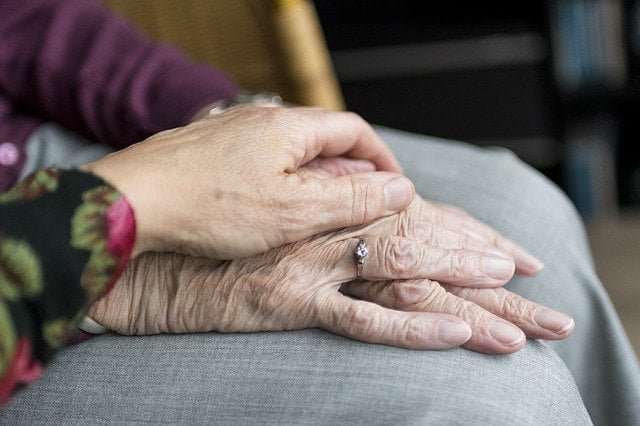
Older person and younger person holding hands at a drug and alcohol rehab in Gloucester
A relapse prevention plan is a written plan of action that can help you to feel more confident in your long-term recovery.
Sadly, despite the effectiveness of modern rehabilitation techniques, the possibility of relapse remains a significant concern for many. [56]
This is partly because drug and alcohol addiction is a disease that cannot be cured – only effectively managed for the rest of an individual’s life.
A relapse prevention plan is often created during your last few weeks of treatment at rehab in Gloucester with the help of your counsellor and medical team and contains strategies and techniques that you will be able to refer to in the event of a potential relapse.
One such technique is HALT, which stands for Hunger, Anger, Loneliness and Tiredness. These are four natural sensations that everyone is likely to experience at some point, however, they can be dangerous to people in recovery as they can make you more vulnerable to relapse.
Keeping HALT in mind can help you to develop a balanced and healthy lifestyle, during which you do your best to keep those four sensations at bay by eating a healthy diet, working on healthy coping strategies, creating a support system and managing stress.
If you are concerned about potential triggers and cravings, another helpful strategy is to role-play certain scenarios with your counsellor.
This will allow you to work out how you will handle specific situations in a way that is conducive to your long-term recovery.
You will also need to be aware of the signs that could indicate that you are heading towards a relapse. Write out a list of as many of these signs as possible and include them in your relapse prevention plan as a reference.
While relapse is extremely common, affecting between 40% and 60% of people in recovery, taking the time to create a relapse prevention plan can give you the tools and confidence needed to reach your recovery goals.
To find out more about how rehab in Gloucester can help you avoid relapse in the future, call us today on 0800 088 66 86
What You Will Get Out Of Drug and Alcohol Rehab In Gloucester?

Two people jumping during a sunset after treatment at a drug rehab and alcohol rehab in Gloucester
Getting over an addiction to alcohol or drugs isn’t as easy as a person just quitting drugs or alcohol [57] and getting on with life. If that were the case, there wouldn’t be countless addicts worldwide who face the despair of addiction every single day.
Drug and Alcohol addiction is a very complicated and multi-faceted condition that can be all but impossible to treat without professional help.
This is why choosing an alcohol or drug rehab in Gloucester or afar is one of the best things an individual addicted to drugs or alcohol could offer themselves.
Rehab in Gloucester offers a person everything they need to successfully get over their addiction and move on with life. Because addiction can quickly ruin a person’s life if not attended to, it is important to seek help sooner than later.
When it comes to addiction, it is not a matter of if an individual will destroy their life, it is a matter of when. Fortunately, though, people addicted to drugs or alcohol don’t have to wait until it’s too late.
By going to a drug and alcohol rehab they can receive the help they need and begin to turn their life around in a positive direction.
Although when facing addiction it can seem like there is no end in sight, rehab is something that offers hope.
When a person gets help and overcomes their addiction, life can truly take on an entirely new meaning. This is something that’s hard to see when facing addiction, which is one reason going to rehab makes so much sense.
Experience all the benefits of drug and alcohol rehab in Gloucester for yourself by giving us a call on 0800 088 66 86
What Are My Options for Drug and Alcohol Rehab in Gloucester?

Couple embracing in a field after treatment at a drug and alcohol rehab in Gloucester or near Gloucester
Below we have listed the two most common approaches to addiction rehab in the Gloucester area. It’s important you look into both options to see which one would benefit you the most.
These include:
1. Residential Drug and Alcohol Rehab in Gloucester or near Gloucester
The option of private rehab is something many people choosing to get treatment tend to consider. Because a private (or residential) is something that takes a patient out of the familiar environment that has been a big part of their life as an addict, many people find it to be the best option.
Being in a setting one is accustomed to using it will only breed temptation.
When someone decides on a private drug and alcohol rehab in Gloucester, they are removing themselves from any outside influence that could possibly hinder their chances at success.
When it comes to residential treatment, there are many different options available. This is something that is quite beneficial about private rehab because it offers someone to pick a treatment modality that will best suit their individual needs.
The possibilities for private rehab in Gloucester and afar are practically endless. From rehabs that cater to women only to centres that take a holistic approach to treating addiction, there is virtually something for everyone when it comes to making a choice about private rehab.
2. Outpatient Drug and Alcohol Rehab in Gloucester and near Gloucester
Private rehab isn’t the only option when it comes to choosing drug and alcohol rehab in Gloucester. For people who can’t get away from home for an extended time, but still want to get help for their addiction, an outpatient treatment centre might be their best option.
While attending an outpatient rehab isn’t as intensive as going to private rehab, it does offer people the tools necessary to overcome addiction if they are willing to try.
When people go to outpatient rehab, they will stay at home for the entire duration of their treatment. This can be especially helpful to those who have family obligations or a job they cannot take time off from.
Because addiction is something that affects everyone, no one is immune to the need for treatment.
People with school responsibilities or even those climbing the career ladder may experience addiction problems. Taking time away from a person’s job or studies isn’t conducive to everyone, which is when an outpatient rehab might make more sense.
Outpatient rehab will have the patient show up for various scheduled appointments at different times of the week. While they will receive the therapy they need, there is no guarantee that they will always have the same therapist. Outside sources of addiction recovery help may also be incorporated into one’s rehab treatment plan.
This could mean going to various free recovery meetings such as Alcoholics Anonymous (AA). All this is entirely up to the individual, so they must make sure that they are 100 per cent committed to the treatment process.
Outpatient rehab in Gloucester might also be best suited for those with addictions that are less severe. Going to an outpatient rehab means that a person is still going to be in the familiar environment they are accustomed to using drugs or alcohol in.
This poses a very serious risk for relapse, and they should ensure they are doing everything in their power not to fall victim to their cravings.
Benefits of Residential Drug and Alcohol Rehab in Gloucester

Therapy group working together at a drug and alcohol rehab clinic in Gloucester
No matter what type of addiction a person is facing, making the decision to go to rehab is one of the best choices they can make. Addiction is a dangerous condition that can quickly go from mild or moderate to something far more severe in a matter of weeks.
Continual substance abuse on a regular basis is something that literally changes the way the brain functions, which can make it seem impossible to quit when deciding they want to change their life.
1. A whole approach to drug and alcohol rehab recovery
Even the most dedicated to achieving sobriety will find they have difficulties simply because addiction is such a complex condition. Not only does someone who is addicted to drugs or alcohol have to contend with physical withdrawal, but the many psychological facets of their addiction as well. Centres that cater to rehab in Gloucester will look at all parts of addiction to ensure patients are healing on every level possible.
2. Increased understanding of drug and alcohol addiction from rehab professionals in or near Gloucester
Going to rehab does something that many addicts who try to quit on their own often miss. This is the education and knowledge about addiction that is necessary to ensure one understands their addiction. Without understanding addiction, it is virtually impossible to overcome it. When an individual chooses to go to rehab, they are also choosing to better understand addiction and the underlying causes of their current addicted state.
3. Peer support and open communication from drug and alcohol rehab staff in Gloucester
Along with becoming more educated about addiction, people attending drug and alcohol rehab in Gloucester will have the opportunity to talk to someone. Therapy is a fundamental part of any rehab and allows patients the chance to talk to a professional about their problems.
The ability to talk to a trained professional who has been trained in addiction counselling is unsurpassed when it comes to overcoming addiction for good. Likewise, whilst peer pressure is often a major cause [58] of addiction, having other addiction sufferers to speak to is the basis of many successful drug and alcohol recovery journeys.
Without someone to talk to, the problems underlying a person’s addiction can be too much to handle.
4. Trusted & alternative drug rehab and alcohol rehab therapies
People in recovery need an outlet, and the therapy offered in rehab is often exactly what they need. Therapy is a huge benefit because it allows someone to talk about their problems to someone who understands.
A therapist can also give the sound advice one needs to relinquish the hold their problems have on them, which can lead them out of the need to use drugs and alcohol to mask their pain. Therapy can also offer the connection many people need to successfully make it through the drug and alcohol rehab recovery process.
Call our helpful, friendly team today on 0800 088 66 86
Aftercare After Drug and Alcohol Rehab in Gloucester
Aftercare is one vital process of rehab that many people fail to miss. When rehab is over, recovery doesn’t end. Aftercare is something offered through rehab centres worldwide because it is often crucial for successfully staying sober.
The importance of attending aftercare once rehab in Gloucester has been completed cannot be stressed enough. Most treatment programmes will include some kind of aftercare strategy.
This could be one that incorporates additional meetings such as AA or NA (Narcotics Anonymous), as well as private therapy if a patient feels they need it.
Aftercare might also include continued education on addiction, as well as any further life skills a person might need to develop.
Fitness programmes can be part of aftercare, as well as various relaxation techniques such as Tai Chi or meditation that can help one maintain a relaxed state of mind.
Attitude is everything when it comes to overcoming addiction. The more tools one is equipped with to keep a positive mental attitude, the better.
Charities & Alternatives to Drug and Alcohol Rehab in Gloucester

Therapy group taking notes at a drug rehab and alcohol rehab in Gloucester or near Gloucester
Several NHS and other free drug and alcohol rehab services operate in Gloucester, including the following organisations:
1. Change Grow Live – Gloucester
Address: 41-43, Imperial Chambers, Longsmith St, Gloucester GL1 2HT
Telephone: 01452 223 014
Website: https://www.changegrowlive.org/drug-alcohol-recovery-service-gloucestershire/gloucester
2. The Nelson Trust Women’s Centre – Gloucester
Address: 1 Brunswick Square, Gloucester GL1 1UG
Telephone: 01452 397 690
Website: https://www.nelsontrust.com/our-services/
Reach out to 12-Step programmes in Exeter like Cocaine Anonymous, Narcotics Anonymous (NA) and Alcoholics Anonymous (AA) for help maintaining your sobriety. This focuses on the concept of a higher power.
Here, you can increase your chances of a successful recovery, by connecting with others on a similar journey.
The NHS provides reliable and free information about drugs and alcohol.
SMART Recovery will help you to manage any drug or alcohol relapse triggers and provide you with plenty of tools and coping mechanisms as you navigate your new life in recovery.
Al-Anon are another vital service open to you and to your friends and family.
Gain mental health support by contacting Rethink Mental Illness, Mind, Young Minds, Samaritans and Papyrus.
You can also reach out to the National Institute for Health and Care Excellence, the NHS Foundation Trust, Turning Point, We Are With You, the National Association for Children of Alcoholics, and Alateen.
Getting Help from Rehab Recovery For Drug and Alcohol Rehab in Gloucester Today

Woman typing on a phone at a drug rehab and alcohol rehab in Gloucester
At Rehab Recovery, we offer free advice from a team of non-judgemental professionals, many of whom are in recovery and understand how hard it can be to change your relationship with addiction.
All of the rehabs we recommend are regulated by the Care Quality Commission (England and Wales) or the Care Inspectorate (Scotland).
The services Rehab Recovery can offer are available across Gloucestershire, including in Cirencester, Stroud, Chipping Campden, Cheltenham, Wotton-under-Edge, Bourton-on-the-Water, Nailsworth, Berkeley, Tetbury, Stow-on-the-Wold, Fairford, Painswick, Bibury, Tewkesbury, Winchcombe, Lechlade-on-Thames, Moreton-in-Marsh, Ampney Crucis, Blockley, Chalford, Northleach, Bledington, Cinderford, Bisley, Dursley, Broad Campden, Bishops Cleeve, Coleford, Ashleworth, Arlingham, Chedworth, Birdlip, Mitcheldean, Alderton, Bourton-on-the-Hill, Kemble, Batsford, Newent, Adlestrop, Alderley, Lydney, Stonehouse, Bagendon, Andoversford, Broadwell, Frampton on Severn, Alkington, Icomb, Didbrook, Minchinhampton and more.
For more information about rehab in Gloucester, reach out to our 24/7, confidential hotline on 0800 088 66 86.
References for Drug Rehab and Alcohol Rehab in Gloucester and near Gloucester
[1] https://nida.nih.gov/publications/drugs-brains-behavior-science-addiction/drug-misuse-addiction
[3] https://www.gloucestershire.gov.uk/media/h32npvqs/understanding_gloucester-10.pdf
[4] https://e-voice.org.uk/fvcshomelessforum/assets/documents/gloucestershire-alcohol-harm-r-2
[5] https://www.ncbi.nlm.nih.gov/pmc/articles/PMC4402015/
[6] https://www.ncbi.nlm.nih.gov/pmc/articles/PMC4553654/
[7] https://drpeeke.com/2015/02/24/pillars-of-recovery-the-three-ms/
[8] https://www.ncbi.nlm.nih.gov/pmc/articles/PMC5672554/
[9] https://nida.nih.gov/research-topics/recovery
[10] https://iv.iiarjournals.org/content/24/5/761
[11] https://www.health.harvard.edu/staying-healthy/11-ways-to-curb-your-drinking
[12] https://www.ncbi.nlm.nih.gov/pmc/articles/PMC3052346/
[13] https://scholar.google.com/citations?hl=en&user=VHMpXXIAAAAJ
[16] https://www.niaaa.nih.gov/alcohol-health/overview-alcohol-consumption/moderate-binge-drinking
[17] https://premierneurologycenter.com/blog/neurologic-diseases-associated-with-alcohol-consumption/
[18] https://www.ncbi.nlm.nih.gov/pmc/articles/PMC4152944/
[19] https://effectivehealthcare.ahrq.gov/products/alcohol-misuse-drug-therapy/consumer
[20] https://www.aafp.org/pubs/afp/issues/2016/0315/p457.html
[21] https://www.ncbi.nlm.nih.gov/pmc/articles/PMC4702510/
[22] https://www.asam.org/asam-criteria/about-the-asam-criteria
[23] https://www.verywellmind.com/dsm-5-criteria-for-substance-use-disorders-21926
[26] https://www.nhs.uk/live-well/alcohol-advice/the-risks-of-drinking-too-much/
[27] https://www.cdc.gov/drinklessbeyourbest/drinkingless.html
[28] https://www.mdcalc.com/calc/1729/cage-questions-alcohol-use
[29] https://www.mountsinai.org/health-library/selfcare-instructions/deciding-to-quit-drinking-alcohol
[30] https://www.ahrq.gov/prevention/guidelines/tobacco/5steps.html
[31] https://www.ncbi.nlm.nih.gov/pmc/articles/PMC3654310/
[32] https://www.verywellmind.com/the-craft-approach-to-substance-abuse-intervention-5191125
[35] https://www.ncbi.nlm.nih.gov/pmc/articles/PMC3321494/
[37] https://www.niaaa.nih.gov/alcohols-effects-health/alcohols-effects-body
[38] https://www.niaaa.nih.gov/publications/alcohol-and-brain-overview
[39] https://www.niaaa.nih.gov/publications/brochures-and-fact-sheets/understanding-alcohol-use-disorder
[40] https://www.ncbi.nlm.nih.gov/pmc/articles/PMC6241194/
[41] https://pubs.niaaa.nih.gov/publications/aa22.htm
[42] https://www.ncbi.nlm.nih.gov/pmc/articles/PMC6876531/
[43] https://www.apa.org/topics/substance-use-abuse-addiction/alcohol-disorders
[44] https://www.niaaa.nih.gov/alcohols-effects-health/alcohol-topics/older-adults
[46] https://agapetc.com/what-is-the-best-antidepressant-for-an-alcoholic/
[47] https://www.ncbi.nlm.nih.gov/pmc/articles/PMC5614930/
[48] https://www.racnj.com/the-five-stages-of-addiction-recovery/
[50] https://www.ncbi.nlm.nih.gov/pmc/articles/PMC2797098/
[51] https://www.ncbi.nlm.nih.gov/pmc/articles/PMC5328289/
[52] https://gpsych.bmj.com/content/32/5/e100087
[53] https://pubmed.ncbi.nlm.nih.gov/32954958/
[54] https://www.ncbi.nlm.nih.gov/pmc/articles/PMC7001356/
[56] https://www.newdirectionsforwomen.org/what-percentage-of-alcoholics-recover/
[58] https://nida.nih.gov/publications/drugfacts/understanding-drug-use-addiction


